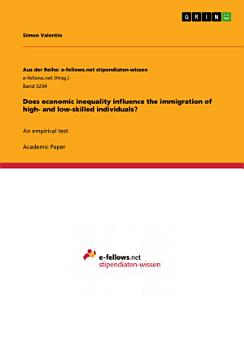Does economic inequality influence the immigration of high- and low-skilled individuals?: An empirical test
Sep 2019 · GRIN Verlag
Ebook
18
Pages
family_home
Eligible
info
reportRatings and reviews aren’t verified Learn More
About this ebook
Academic Paper from the year 2019 in the subject Sociology - Economy and Industry, grade: 1,0, Hertie School of Governance, language: English, abstract: With having in mind the effect of high- and low-skilled migration for economic prosperity, this study empirically tests with immigration data from 20 countries from the Organisation for Economic Co-operation and Development (OECD) from 1985 to 2010 the effect of inequality in a receiving country on high- and low-skilled migration to this country, so that the research question that this study seeks to answer is: Does economic inequality influence the immigration of high- and low-skilled individuals? In the broad context of the study of economic inequality within societies, one of the most prominent topics is the relationship between inequality and economic prosperity of a country, which is studied by many authors such as Kenworthy (2003) or Wren (2013). With this study, I want to contribute to this research by focusing on one possible mechanism within the inequality-economic prosperity relationship, namely migration. Attracting and retaining highly qualified people is crucial to the development of a knowledge-based economy in which ideas and innovation drive technological and social progress. Moreover, the perception and acceptance of immigration within a society are largely shaped by the skill level of immigrants. Understanding how high-skilled people and in contrast, how low-skilled people choose their country of destination when migrating is, therefore, crucial – for sending and receiving countries alike. Migration and especially cross-border migration is a highly complex topic and the individual decision to migrate is influenced by a multitude of drivers. However, when looking at the differences between high- and low-skilled migrations, economic drivers are especially important, because more than for other drivers such as political or social drivers they affect high- and low-skilled people differently. Assuming that migration is at least partly determined by the desire to realize economic opportunities abroad and assuming that high-skilled migrants should benefit from the opportunities in less equal destination countries, while low-skilled migrants should benefit from a compressed wage distribution in more equal destination countries, a stream of literature, building on Borjas (1987), studies the relationship between inequality in sending and receiving countries and the consequences for high- and low-skilled migration.
Rate this ebook
Tell us what you think.
Reading information
Smartphones and tablets
Install the Google Play Books app for Android and iPad/iPhone. It syncs automatically with your account and allows you to read online or offline wherever you are.
Laptops and computers
You can listen to audiobooks purchased on Google Play using your computer's web browser.
eReaders and other devices
To read on e-ink devices like Kobo eReaders, you'll need to download a file and transfer it to your device. Follow the detailed Help Center instructions to transfer the files to supported eReaders.






